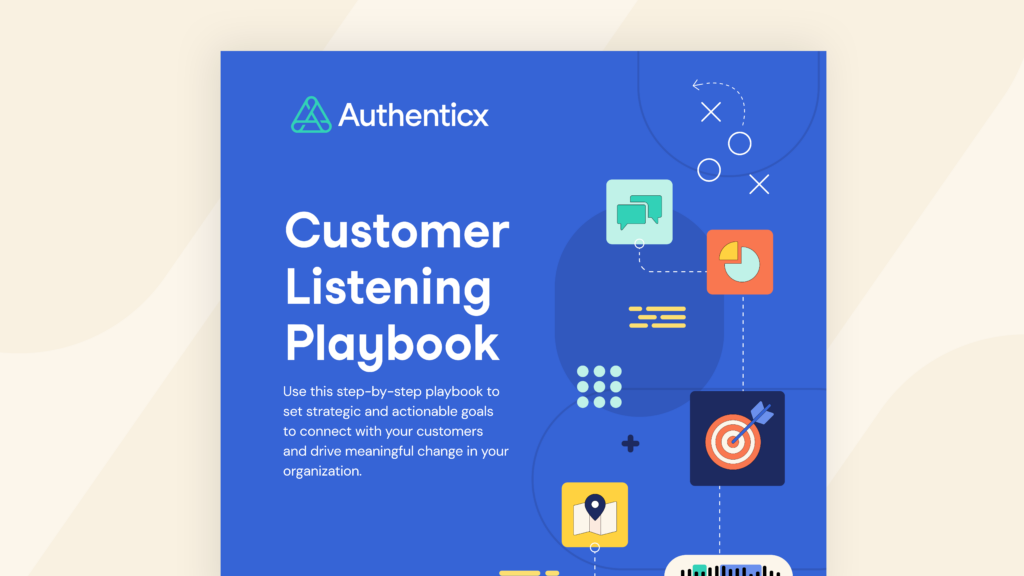NPS is a Metric, Not a Strategy.
Ask the 4 important questions to consider whether your company goes beyond the metrics that improve CX.
Read More
Download the Checklist: 5 Ways to Listen to the Voice of your Customers
This checklist shares 5 ways to build an effective, immersive insights program that listens to the voice of your customers providing honest and raw feedback.
Your customers are talking. Are you listening?
Tap into customer conversations to reveal qualitative feedback. This unfiltered source of insights accounts for every customer voice – even those who don’t respond to surveys.
Start Listening
Net Promoter Score Health Insurance
The net promoter score (NPS) is useful for industries of all kinds but crucial to the healthcare and health insurance industries. This is because this score is a direct reflection of how well your customer service performs and helps health insurance companies identify how they can improve for their customers. Healthcare is an industry that highlights customer service and strives to improve customer satisfaction as much as possible. After all, no one wants to go to the hospital or doctor’s office, but these trips are essential to improve their quality of life and their overall health.
If an NPS score measures loyalty, you may wonder, what is a good NPS score? Many people are familiar with the 0-10 scores on post-procedure surveys, and an NPS survey is typically structured the same way for customers. These surveys are just one question. Typically they ask how likely the customer is to recommend your service to a friend, family member, or colleague. Your respondents will give a rating between 0 and 10, with 0 being not likely at all and 10 being extremely likely. The goal of these surveys is to get an accurate notion of how likely your customers are to recommend your services to others. In other words, the goal of this survey is to assess how well your customer service is doing and whether or not your customer experience is good enough to warrant a recommendation. Your NPS score for your business is a measure between -100 and 100. If your overall score is closer to 100, then you have more promoters than detractors, but if it is closer to -100, then you have more detractors than promoters. You can calculate this score by subtracting the percentage of detractors from the percentage of promoters. The formula is as follows:
NPS = % promoters – % detractors
Companies with the highest NPS scores will likely have the highest number of happy customers, but this is not always the case. It is important to recognize that while metrics like NPS scores are crucial to measure because they can offer invaluable insights into your customer experience, they may not always reflect the true experience of your customers. Why is this? Well, typically, the customers who fill out surveys are customers who are either incredibly satisfied with your service or incredibly unsatisfied with your service. This means that you may end up with dramatically varying survey answers and only seeing the extremes of your customer service performance. Additionally, other survey respondents may feel obligated to respond to your surveys and not answer them as carefully as you may like.
However, even though you may not get an NPS score from all of your customers, it remains a crucial measurement metric for healthcare insurance companies because it provides insight into how well you are serving your customers. The higher your NPS score, the happier your customers are, which means you are doing your job well. Of course, a lower NPS score means you have areas of your customer service that need improvement.
NPS Insurance Meaning
As mentioned above, a net promoter score in insurance simply reflects how likely your customers are to recommend or promote your company to people they know. Now, you may wonder what is a good NPS score for an event or service. Typically you want your NPS scores to be in the 9 or 10 range. These are the satisfied customers who are most likely to recommend your services. Customers who respond with a 7 or 8 are likely satisfied with their service but unlikely to recommend your organization. Customers who respond with a 6 or below are likely unhappy with at least one aspect of their service and are unlikely to recommend your services — they may even inform others not to use your services.
NPS scores are an important metric because it helps your organization to assess how well you are serving your customers. Whether you are trying to determine your business’s NPS for refund insurance or any other service you provide, this score provides a crucial overview of how well your customer service is performing and how satisfied your customers are. Satisfied customers are more likely to recommend services. The more you can improve your customer satisfaction rate, the more likely your customers will be to recommend your insurance services to others.
Unfortunately, it can be challenging to identify the areas that need improvement from your health insurance NPS scores alone. To truly understand how to improve your customer satisfaction, you must use a mix of surveys, like the NPS survey, and the valuable customer data that your customers offer during calls and messages with your customer service representatives. These calls are typically the best way to discover what is happening with your customers and identify what areas of your customer service need improvement.
Net Promoter Score Healthcare Benchmarks
If you are still wondering how NPS scores work, you may be wondering what the net promoter score benchmarks by industry are. Are the benchmarks different from industry to industry, or are they the same throughout? Before diving into this, you need to understand what the Bain NPS benchmarks are. Bain & Company are the creators of the NPS score, and they classify any score over 0 as good and any score under 0 as bad. More than this, though, a score of 50 is above average, and a score of 80 or above puts your organization in the top percentile. Again, you can find your NPS using the net promoter score calculation mentioned above.
Now, there are two primary ways of measuring your NPS. These two primary NPS benchmarks are your absolute NPS and your relative NPS. Absolute NPS simply tells you your NPS score using the calculation mentioned above. Your relative NPS score, on the other hand, details how you compare to other businesses in your industry. For example, if you are an online book retailer looking for your relative NPS score, you would need to compare your NPS score to other online book retailers, which could include common companies like Barnes & Noble and Amazon NPS scores. Your relative NPS score would describe how your business stacks up compared to other businesses in your industry. So, while there are not necessarily separate healthcare or B2B NPS benchmarks in the sense that you have to completely change how you measure your NPS, there are different NPS score benchmarks that you should be meeting in your industry to remain competitive. In other words, your NPS score can be used to compare your organization to others in your industry to get a more accurate representation of where you sit compared to your competitors.
How It Works
Gain a deeper level understanding of contact center conversations with AI solutions.
See a PreviewAggregate
Pull customer interaction data across vendors, products, and services into a single source of truth.
Analyze
Collect quantitative and qualitative information to understand patterns and uncover opportunities.

Activate
Confidently take action with insights that close the gap between your organization and your customers.
Net Promoter Score Benchmarks
If you are wondering how you can use NPS benchmarks to see how your organization stacks up against your competitors, you may wonder how you can find NPS scores by industry. Luckily, with how extensive the internet is today, finding net promoter score benchmarks for healthcare, and other industries, such as NPS benchmarks for education, is quite simple. You can simply search “net promoter score healthcare,” or if you are looking more specifically for physician or pharmaceutical benchmarks, you can search for “net promoter score physicians” or “net promoter score pharmaceutical industry,” respectively. These searches will help you find the benchmarks for your industry so you can see where you sit compared to your competitors.
As mentioned before, you can calculate your NPS score by subtracting the percentage of detractors from the percentage of promoters for your business. Then, using the benchmark for your industry, you can see where your organization places compared to your competitors. For instance, if you have an NPS score of 10, and the benchmark for your industry has a low of 4, an average of 18, and a high of 38, then you would know that your organization is a little below the average for your industry. So, whether you are looking for net promoter score benchmarks in education, healthcare, or even software, you can easily find your industry’s benchmark range online. For example, if you are looking for the NPS benchmarks in the health insurance industry, you may see that health insurance companies typically receive an average NPS of 7.
How To Improve NPS In Healthcare
Now that you can answer the questions “what does NPS stand for in healthcare?” and “what is a good NPS score by industry?” you can learn how to improve your NPS score. You know how to calculate your organization’s net promoter score and how to find the net promoter score health insurance benchmarks, but you haven’t figured out yet how you can boost your NPS score. Using NPS healthcare benchmarks can be a great way to determine where you currently stand in comparison to your competition, but it does not help you improve your own NPS score.
Unfortunately, there is no easy way to improve your NPS score immediately. To improve your customers’ likelihood of promoting your organization, you need to improve your customer experience. To reach a higher point in the healthcare NPS benchmark, you need to consider what areas of your customer experience need to be improved and make efforts to improve them. Luckily, you can do this by simply listening to what your customers have to say. Rather than relying exclusively on surveys, you can use the wealth of data your customers offer when they call your customer service centers.